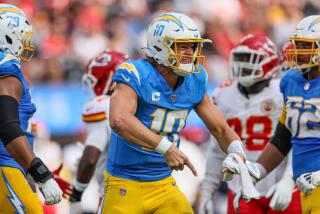Same Old Chargers
- Share via
Last spring, rebirth and renewal for the San Diego Chargers seemed right around the corner. Under the leadership of General Manager John Butler, they were looking forward to a new training camp on the outskirts of Los Angeles, with perhaps a new home in L.A. to follow down the road.
They had a young quarterback whose potential seemed about to be realized, one of the best running backs in the league and one of the most coveted free agents, signed, sealed and about to deliver.
Years of frustration appeared to be fading in the bright promise of those heady days.
Six months later, however, that optimism has faded and the mood of the team is as dark as the smoke-filled skies of its city.
The fortunes of a football team pale in comparison to the lives and homes lost in the fires that have spread across San Diego County. But it seems fitting that, in their season from hell, the Chargers find themselves in an environment resembling Dante’s Inferno.
Those glorious days of spring didn’t last:
* On April 11, Butler, who was hoping to duplicate in San Diego the success he had with the Buffalo Bills, died of complications from lung cancer at 56.
* The Chargers’ first training camp in Carson was greeted by fans with about as much enthusiasm as they demonstrate for traffic jams on the neighboring 405 freeway.
* Any lingering hopes the Chargers might have had that Los Angeles would embrace a team whose first home was the Coliseum was lost in the standings. L.A. doesn’t embrace losers and the Chargers have certainly been losers this season.
Coming off 1-15 and 5-11 seasons in the previous two years, San Diego climbed up to 8-8 in 2002, going from fifth in their division to third.
But this year, it’s back to the bottom, the Chargers anchored firmly in last place in the AFC West at 1-6.
The reasons? You could probably make a case for 21 of them, with struggles at every position except running back, where LaDainian Tomlinson has somehow been able to shake off the Chargers’ endless problems as effectively as he shakes off opposing defenders. Tomlinson has rushed for 719 yards, sixth best in the league, averaged 5.1 yards and scored four touchdowns.
So much for the highlight reel.
The Chargers had hoped quarterback Drew Brees, in his third season, would begin to show the kind of mastery of an offense he demonstrated at Purdue. Instead, he has regressed, having had 11 passes intercepted this season and having thrown only seven touchdown passes.
In last Monday night’s 26-10 loss to the Miami Dolphins, Brees had passes intercepted on San Diego’s first two possessions, and had another one picked off later.
The man projected to be his primary receiver, David Boston, has struggled since coming aboard as a free agent, both with injuries and a personality clash with the coaching staff, resulting in a one-game suspension.
On defense, the Chargers traded linebacker Junior Seau, the emotional leader of the team for so many years, and released safety Rodney Harrison in the off-season, keeping cheaper and younger -- and far less talented -- players. San Diego has given up 195 points. Only two other clubs have surrendered more.
Then came Monday’s scheduled home game against the Dolphins. With the fires spreading and Qualcomm Stadium needed as an evacuation site and police concentrating on fire duty, “Monday Night Football” was moved for the first time, the game relocated to Sun Devil Stadium in Tempe, Ariz. That was estimated by the research firm of Joyce Julius and Associates to have cost Qualcomm $1 million in lost television exposure, not to mention lost revenue from a home game that had been sold out.
Fans in Tempe were admitted free.
There were much bigger losses, though, for others associated with the club. John Hinek, the team’s director of business and stadium operations, former public relations director Rick Smith and fellow former front-office employees Rudy Feldman and Rich Israel all lost their homes to the fires..
“It’s almost like some kind of curse,” said Hank Bauer, a former Charger player and coach who is an analyst on team broadcasts. “The ownership deserves better. They’ve certainly spent the money, but it hasn’t worked out. We’ve had some bad seasons, but, starting with John Butler, I never remember a season being this bad.”
Nor does the future look much brighter.
Talks continue to drag on between the team and the city over a new stadium with no resolution on the horizon. And with public money growing even tighter with the ballooning bill from fire damage, the Chargers’ chances of tapping into public funds seem remote.
“It’s not as if we have made a lot of progress so far,” said Mark Fabiani, special counsel to the team. “This train has been rolling down the tracks without a lot of momentum. You could say it may get slower now, as a result of the fires, but it’s been pretty slow as it is.”
And here’s the really scary thought for the Chargers: As bad as this season has been, it’s not even half over.


